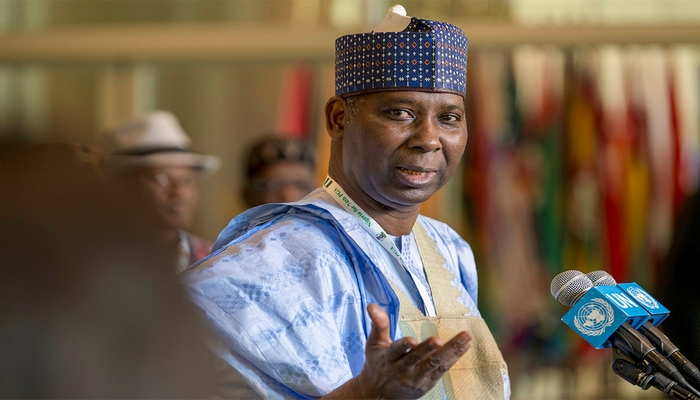
The President of the United Nations General Assembly (UNGA), Tijjanu Muhammad-Bande says reforming the UN Security Council to give powers to others is not going to be an easy tasks.
He disclosed this on Monday when he held a virtual interactive session with Nigerian-based foreign and diplomatic correspondents.
He said that although all organs of the UN were undergoing reforms, that of Security Council was particularly not going to be easy.
“All organs of the United Nations are undergoing reforms including the secretariat in terms of how it serves countries around the world, in terms of representation.
“There has been ad hoc discussion on the revitalization of the work of the General Assembly, we have been able to align processes around the work of the UN, there is a lot of effort at reforms.
“Security Council reform is also ongoing at an inter-governmental negotiation framework
“In the next few weeks and few months impactful meetings can happen and we expect more progress to be made to reform the Security Council.
“But make no mistake about it, it is not going to be an easy ride for anyone, it is a very complex issue trying to get power to others from those who currently hold it,” he said.
The UNGA President however noted that most of the reform process have been slow due to difficulty to hold impactful meetings involving all countries at the same time.
He disclosed that some progress has been made in terms of the common African position.
The News Agency of Nigeria (NAN) reports that the current negotiation process for reforms is based on ”Decision 62/557” which was adopted in 2008.
It defines five key issues for reform: categories of membership, the question of the veto, regional representation, the size of an enlarged Security Council and its working
NAN reports that ”decision 62/557” also stipulates that any solution must garner “the widest possible political acceptance”, although in 1998 the UN General Assembly already agreed that the support of two-thirds of UN member states is sufficient.
Any reform of the Security Council would require the agreement of at least two-thirds of UN member states in a vote in the General Assembly and must be ratified by two-thirds of Member States.
All of the permanent members of the UNSC (which have veto rights) must also agree.
The permanent members are China, France, Russian Federation, the UK and the U.S. (NAN)






